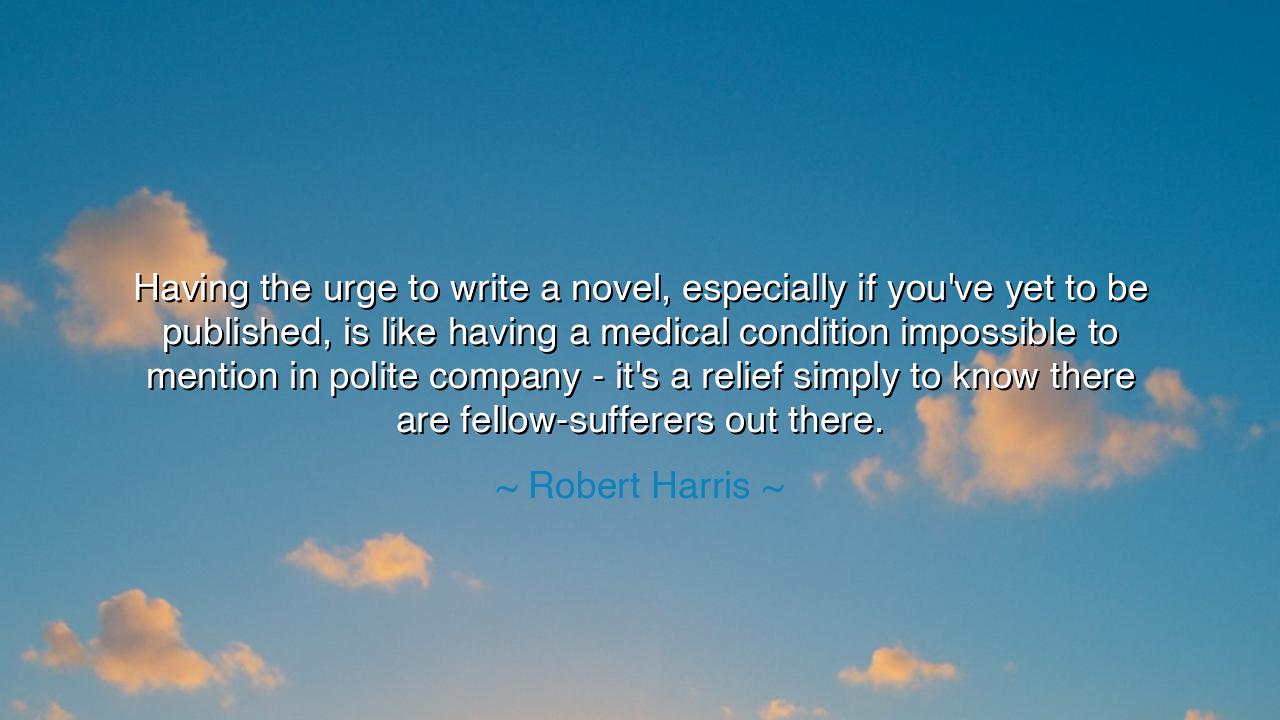
Having the urge to write a novel, especially if you've yet to be
Having the urge to write a novel, especially if you've yet to be published, is like having a medical condition impossible to mention in polite company - it's a relief simply to know there are fellow-sufferers out there.






The words of Robert Harris—“Having the urge to write a novel, especially if you've yet to be published, is like having a medical condition impossible to mention in polite company – it's a relief simply to know there are fellow-sufferers out there.”—strike with humor, but beneath the laughter lies a truth as old as storytelling itself. He speaks of the strange, almost uncontainable fire within those who long to create, the restless compulsion to shape worlds with words, even when the world outside sees such yearning as folly or presumption. The comparison to a medical condition is no accident, for the desire to write is not always chosen; it is carried like a fever, a hunger that presses from within until it demands release.
From the days when bards sang epic poems beside the fire to the scribes who inked sacred texts in dimly lit chambers, the call to write has often been a solitary burden. To harbor the secret wish of becoming an author, especially without the certainty of publication, is to live with both passion and doubt entwined. Harris confesses what many have felt: that it is a hidden ache, seldom voiced for fear of mockery, yet deeply real, consuming, and impossible to silence. Like a hidden illness, it isolates the sufferer—until they discover others who share the same compulsion, and suddenly, their loneliness dissolves into fellowship.
History gives us countless examples of this hidden fire. Consider Franz Kafka, who wrote with an intensity born of anguish, yet published almost nothing in his lifetime. He believed his work would never be valued, instructing his friend Max Brod to burn his manuscripts after his death. And yet, those very works—The Trial, The Metamorphosis—became immortal, speaking to generations about alienation and the human condition. Kafka was a “fellow-sufferer,” tormented by the urge to write, uncertain of recognition, yet driven by a voice that could not be silenced. His story mirrors Harris’s image of writing as both burden and balm.
The meaning of Harris’s words also lies in the paradox of creativity: it is both gift and weight. To write a novel is not only to weave sentences, but to wrestle with one’s own soul, to face rejection, to endure silence. Society often understands practical professions—doctor, farmer, merchant—but to say, “I wish to be a novelist,” before one has been published, can sound like delusion. Thus, the would-be writer often hides their passion, nursing it in secret, carrying it like an unspoken ailment. Yet when they meet others—writers, readers, dreamers—they find solace: their suffering is shared, and therefore lightened.
Harris’s imagery also honors the role of community in creativity. For though the act of writing is solitary, the struggle is not. Every writer draws strength from the knowledge that others before them have faced the same fears: the blank page, the fear of failure, the long silence before recognition. To find “fellow-sufferers” is to find courage, to know that the path is difficult not because one is weak, but because it is the nature of the journey. This kinship transforms isolation into perseverance.
The lesson here is luminous: do not despise your hidden fire, even if the world does not yet honor it. If you feel the compulsion to create—whether to write, to paint, to compose—recognize that this is not folly, but a calling. Seek out those who share it, for in their company you will find strength. Understand that recognition may come late, or not at all, but the act of creating itself is healing, like the relief Harris describes when the secret is shared among kindred souls.
Practical action is clear: if you burn with the desire to write, write. Do not wait for permission, nor for the promise of publication. Join circles of writers, read the works of those who once doubted themselves, and lend your voice to the unbroken chain of storytellers through the ages. And if you meet another soul burdened with the same secret hunger, do not mock them—encourage them, for they are kin in the ancient art of giving shape to human experience.
So let Harris’s words echo like both jest and wisdom: the urge to write may indeed feel like a strange affliction, but it is one of the most noble “illnesses” ever known. For from this shared fever come the novels, the stories, the myths that shape civilizations. Honor the fire, honor the struggle, and seek your fellow-sufferers—for together, you will transform suffering into creation, and creation into immortality.






AAdministratorAdministrator
Welcome, honored guests. Please leave a comment, we will respond soon